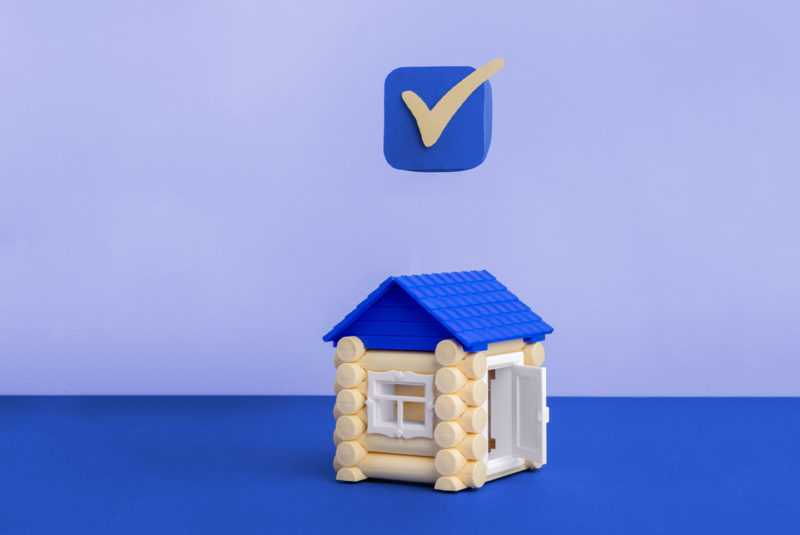Ready To Buy a Home?
Get Approved to Buy a Home
Rocket Mortgage® lets you get to house hunting sooner.
Whether you’ve lived in it for 3 years or 30, your home is a part of your life.
As a homeowner, it’s also a big part of your financial future. So if you’re thinking about selling your home, it’s usually for a good reason:
- Your family is growing and you need to find a larger home
- You need to move for work
- You have taken ownership of a family home and choose not to live in it
You may also need to sell your home if you’re having financial problems or need to short sell your home to avoid foreclosure.
Of course, like the Rolling Stones, you want to be able to say “time is on my side” before you sell.
Knowing when to sell your home is about more than dates on a calendar. It’s about timing and managing the sale of your home to ensure that you can get the most value from the sale before it becomes someone else’s home.
So when is the best time to sell your home?
When People Want to Buy: Time It Right
What is the best month or season to put your home on the market? The traditional answer is late spring, early summer. Why?
- Cabin fever: The days are getting longer, the trees are in bloom and the weather is warm. After being cooped up all winter long, people are looking for a change. It’s a good time to be outside and walking through neighborhoods looking for open houses.
- Tax refunds: After April 15, people’s tax return money may start burning a hole in their pockets.
- Curb appeal: Let’s face it, houses look more appealing in the spring and summer. The grass is greener and the sunlight flooding your home will beautify it better than the Clarendon filter.
- More time to move: The summer gives everyone more time to move. The days are longer and people are making full use of their vacation time. If the home buyers have kids, they’ll have enough time to get them registered for the coming school year.
The idea is that homes listed around April and May will be snatched up first, with sales continuing through the summer.
By fall, the weather gets colder and home sales tend to decline. By winter, everyone is focused on the holidays. Come January and February, everyone is recovering from the holidays and prepping to file their tax returns. And in early spring the cycle repeats.
Of course, that only makes sense if you live somewhere where you have a winter.
In sunbelt states, like Florida and Arizona, December can be peak season for sales because the weather’s cooler, and new home buyers looking for a winter home may be eager to be moved in just in time for Christmas.
In high-demand areas like New York, New York, or San Francisco, California, it’s always a seller’s market!
‘Tis the Season: Strategies for Selling
While spring and summer tend to be prime selling times, it’s possible to sell your home in any season.
Spring
Spring is prime time for selling a home. But because there are more buyers, you can also expect a lot of inventory on the market.
If you’ve had your house up for sale through the winter, take it off the market so it comes across as a new listing. You don’t want your home to look stale. Buyers tend to gravitate toward new listings, and you want your home to look fresh.
To augment that feeling of freshness, spruce up your landscaping. Your lawn will grow fast during the spring, so keep it freshly mowed. Take advantage of the growing season to plant colorful flowers, and trim away overgrown vegetation and tree limbs. You may still have to deal with some inclement weather, so make sure there’s a place to stow umbrellas when potential buyers come to visit.
Summer
In summer, families come out in droves, hoping to move into a new home before school starts. If you’re selling during summer, highlight your outdoor living areas. Stage your patio or deck area so prospective buyers can envision themselves relaxing there. If you have a pool or outdoor kitchen, show it off.
Make sure to keep your landscaping looking fresh. This is not the time to let your lawn develop brown patches, so water everything frequently. And if you’re holding open houses with the summer heat, crank that AC early in the morning to cool down your home and turn on all the ceiling fans.
Fall
You need to move quickly if you’re selling your home in the fall, as peak selling season is on the wane. List as early as you can and draw plenty of attention to the strengths of your school district. Take photos that show off the fall colors of your foliage – and keep that lawn raked! Some welcoming decor touches, such as pumpkins on the front porch, can set the right tone for your visitors.
Winter
The good news about selling your home during the winter? You know the buyers are serious. Make your home welcoming by starting a fire and turning on the heat.
If you live in an area that gets snow, make sure your walkways, driveway and front steps are fully shoveled. It also helps to keep the front of your home free of the grime that can build up during winter. Cozy decor inside can help your home feel like a great purchase as well.
When the Housing Market Is Your Friend: Buy Low, Sell High!
The only constant is change. It’s one of the laws of nature and one of the rules of the housing market. Experts can make predictions, but no one knows exactly what the housing market will do. That said, there are some easy-to-read signs that you can count on when trying to figure out if it’s a good time to sell.
Interest rates
When mortgage rates are low, homes become more affordable and home buyers are motivated to search. Another benefit is that low interest rates can make it easier for you to borrow against your home equity if you need to make repairs or renovations before you sell.
Changes in the area
Neighborhoods can change in the blink of an eye. Your grandparent’s working-class neighborhood may be flooded with young families, and that sketch industrial area is an on-trend arts district.
Depending on where you live and your time frame, if a neighborhood is going through a renaissance or turnover, you may benefit from waiting for prices and competition to rise before you sell.
On the flip side, if an area is losing businesses, and people are moving while new buyers aren’t replacing them, it may be a big red flag that it’s time to sell quickly before prices drop further.
In addition, the region you live in may work in your favor at certain times of year. For example, according to the National Association of REALTORS®, if you live in the Midwest or the Northeast, selling during peak season is especially important, as sales slow down precipitously at other times of the year.[1] If you’re in the South or the West, the time of year you choose to sell doesn’t matter quite as much.
Seller’s market or buyer’s market: It depends
The rules of supply and demand are fixed, especially in the real estate market. When the number of buyers exceeds the number of sellers, there’s increased competition, which increases prices and makes potential buyers more willing to meet your list price.
If you want to gauge demand, look at your neighborhood as if you were a home buyer. Ask yourself these questions:
- Does the number of available homes seem to be growing?
- Are home prices rising or falling?
- Are homes staying on the market for less than a month?
- Are homes selling at or above the asking price?
If the answers to all of these questions are yes, you may be in a seller’s market and it may be a good time to sell. A real estate agent can help you gauge the market as well.
Absorption rate
The absorption rate is a formula real estate professionals use to gauge whether it’s a buyer’s market or a seller’s market. Simply divide the number of homes listed over a period of time by the number of homes sold in the same period.
- 5 or lower: Seller’s market
- 7 or higher: Buyer’s market
2022 Real Estate Market Trends
While the ups and downs of the pandemic helped make the 2021 real estate market a bit unpredictable, market trends are settling down for 2022. It’s still a seller’s market, but some windows are opening up for first-time buyers.
2022 interest rates
Mortgage rates have already started to inch up this year, and that trend is expected to continue through the year. While interest rates can be affected by everything from natural disasters to the war in Ukraine, expect 30-year fixed rates to average around 4.3% or higher by the end of the year.[2]
As a result, affordability will become even more of a consideration, especially for first-time buyers.
2022 home prices
Home prices leaped by an average of over $50,000 between 2020 and 2021, but that rapid growth that made so many sellers happy is slowing down. The National Association of REALTORS® expects more modest appreciation through 2022.[3] This gives buyers a chance to work their way into the market, especially because those interest rate increases should help slow the growth in home prices.
Buyer demand is expected to stay strong through the year with an average of almost five offers for every home on the market.[4] But inventory continues to remain low.[5] That means buyers may have to lower their expectations a bit or widen their geographic search area to find what they’re looking for.
Demographics of home buyers
Millennials made up the largest share of home buyers at 43%, while baby boomers were the largest sellers. But the recent seller’s market has been a formidable barrier to entry over the last couple of years. Meanwhile, Gen X had the highest incomes and bought more expensive homes and more multigenerational homes, possibly intending to use them as investment properties.[6]
Demographically, Latinx home buyers are moving into the forefront and are expected to become the largest group of home buyers in the next decade or so. That could be good news for sellers in the Sun Belt.[7]
iBuyers
Another factor affecting the market for buyers has been the rise of so-called iBuyers. These are corporate buyers ready to buy instantly (that’s what the “i” stands for), often for cash.
Corporate buyers such as Zillow, Opendoor and Offerpad spent much of 2021 paying above market price for Sun Belt homes, which stressed the already low inventory. When iBuyers then flipped those homes, it nudged prices even further upward. While the iBuyer trend is expected to continue, their offers are expected to come back to realistic levels in 2022.
When Your Home Looks Good: Appearances Count
Before you sell, you’ll want to present your home in the best possible light.
To do this, you’ll need to improve your home’s inside and outside appearance by making repairs, renovating, landscaping, cleaning and staging your home.
Or if you prefer to sell your home “as-is,” make sure you understand how that can affect the type of buyers you’ll attract and how much they’ll be willing to pay.
You’ll also want to make sure your home’s finances are solid. Make sure you’re up to date on property taxes and mortgage payments. You can also check your property title to make sure there are no outstanding liens or other red flags on your home that might scare off potential home buyers.
When You Can Sell For A Profit: Keep Money In Your Pocket
As a home seller, the profit you’ll make from your home sale is measured as home equity. It’s the difference between the balance of your current mortgage and the sale price of your home. Ideally, you’ll want to have equity available to apply toward your next home or the next stage of your life.
But before your home has been sold, you’ll need money to cover realtor commissions, closing costs, fees and expenses related to the sale of your home.
You may also need money to make additional repairs if a home inspection reveals issues. If you don’t have enough equity to cover these expenses, you may find yourself in debt after you sell your home.
When You Have a REALTOR® or Sales Agent: They Have Connections
Perhaps no single expense is greater than the commissions for both your real estate agent and the buyer’s real estate agent. These fees can equal 3% – 6% of the sale price. Listing your house as For Sale By Owner (FSBO) can save you thousands of dollars. But you’re also likely to make mistakes when selling your home. There are significant advantages to working with a real estate agent:
Experience is on your side
Real estate agents may prefer to work with fellow professionals rather than negotiate directly with home sellers. But they also may steer their clients away from FSBO sales, reducing the number of potential buyers for your home.
Price and reality check
A good real estate agent will help you price your house so that it’s competitive. Price too low, and you’ll lose money on the sale. Price it too high, and you’ll turn off potential buyers before they even make an offer.
Check your feelings: Prevent emotional selling
We all have deep emotional connections to our homes, and we may also have financial goals and dreams connected to the sale. A real estate agent can make sure you follow the Corleone family mantra: “It’s not personal. It’s strictly business.”
Listing your home
Real estate agents have access to listing networks and resources that will allow your home to be seen by more potential buyers in less time. They’ll also know all the secrets of how to sell your home.
Sell your home online
More home buying than ever happens online. One study from the National Association of REALTORS® (NAR) shows that 93% of home buyers use websites to research their next purchase.[8] So listing your home online is a vital part of the home selling process. A REALTOR® can help list your home online, arrange for professional home photos, and they can create virtual tours that will put your home in front of more eyes.
Handle the paperwork
Selling a home requires lots of paperwork. Real estate agents are trained to know what’s required and how to get it done without making a mistake. A real estate agent also has a network of lawyers, notaries and other real estate professionals at their beck and call, saving you the time and expense.
So You’re Ready To Sell Your Home
Selling your home can be a complicated process, both financially and emotionally. If you time it right and find the right time to sell, it can make the process easier and help you get more money from the sale.
Looking to make a change?
Whether you want to buy a house, refinance or take cash out, you’re not alone. The experts are just a click away.
The Short Version
- The best times of year to list are during spring and summer, but there are exceptions
- Listing your house during a seller’s market can increase competition and sales prices
- Working with a REALTOR® or selling agent can help you navigate the selling process
National Association of REALTORS®. “Seasonality in the Housing Market.” Retrieved April 2022 from https://www.nar.realtor/blogs/economists-outlook/seasonality-in-the-housing-market
National Association of REALTORS®. “Instant Reaction: Mortgage Rates, March 17, 2022.” Retrieved April 2022 from https://www.nar.realtor/blogs/economists-outlook/instant-reaction-mortgage-rates-march-17-2022
National Association of REALTORS®. “Housing Affordability Index (4/8/2022).” Retrieved April 2022 from https://cdn.nar.realtor/sites/default/files/documents/hai-02-2022-housing-affordability-index-2022-04-08.pdf
National Association of REALTORS®. “February 2022 REALTORS® Confidence Index Survey: Buyer Competition Intensifies to 5 Offers Per Home Sold.” Retrieved April 2022 from https://www.nar.realtor/blogs/economists-outlook/february-2022-realtors-confidence-index-survey-buyer-competition-intensifies-to-5-offers-per-home
Forbes. “10 Cities Where Housing Inventory Is Crazy Low In 2022.” Retrieved April 2022 from https://www.forbes.com/sites/andrewdepietro/2022/03/29/10-cities-where-housing-inventory-is-crazy-low-in-2022/
National Association of REALTORS®. “Home Buyers and Sellers Generational Trends.” Retrieved April 2022 from https://www.nar.realtor/research-and-statistics/research-reports/home-buyer-and-seller-generational-trends
Urban Institute. “The Number of Hispanic Households Will Skyrocket by 2040. How Can the Housing Industry Support Their Needs?” Retrieved April 2022 from https://www.urban.org/urban-wire/number-hispanic-households-will-skyrocket-2040-how-can-housing-industry-support-their-needs
National Association of REALTORS®. “Real Estate in a Digital Age.” Retrieved April 2022 from https://www.nar.realtor/research-and-statistics/research-reports/real-estate-in-a-digital-age




